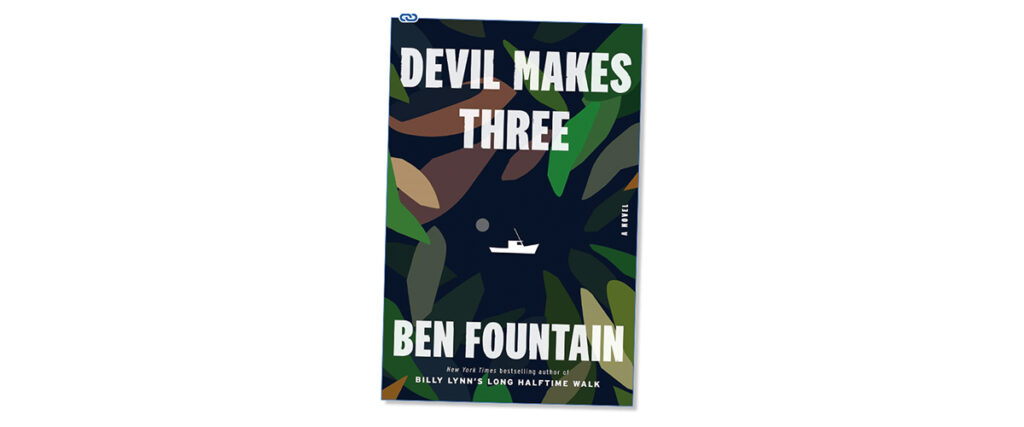Omnivorous Reader

Dicey Drama in Haiti
Looking for treasure but finding trouble
By Anne Blythe
Given the political fracture in this country and the intensified drumbeat of questions about the survival of democracy, it might seem daunting to tuck into Ben Fountain’s Devil Makes Three: A Novel.
The sheer size of the North Carolina native’s latest book — 531 pages — is intimidating enough. When you throw in that it’s a deep dive into life in Haiti immediately following the 1991 military coup that sent President Jean-Bertrande Aristide into exile, you might be tempted to put this novel about abusive power, excessive greed and dictatorship back on the shelf and save it for a less divisive time.
Don’t do that. Instead, open Fountain’s work of fiction. Let the story pull you from a once blissful beachfront through streets littered with butchered corpses and the headless body of a mayor, to crumbling estates, voodoo priestesses and treasure hunts on the turquoise waters lapping against the former French slave colony fallen under the rule of an oppressive military regime. A political thriller and adventure-filled page-turner, Devil Makes Three explores a country in turmoil from different angles through four main characters in their 20s.
Matt Amaker is a rootless American college dropout drawn to Haiti with unrealized ambitions after circulating through the Caribbean as a “dive gypsy.” Alix Variel, the ambitious and beguiling son of a prominent Haitian family, persuades Matt to come with him to Haiti to start a dive shop of their own catering to a wave of the expected tourism before the coup upended the country’s dreams of democracy and prompted international trade embargoes.
Despite the upheaval, Matt and Alix have not given up all hope on ScubaRave being a successful business, and turn their attention to hunting Conquistador treasure and artifacts in the under-explored ocean waters off Haiti.
“Haiti has treasure,” Alix tells Matt while they are smoking a joint and pondering their future.
One wreck he was aware of had as many as 12 cannon among the wreckage. If they were bronze, they could attract high-end collectors, deep-pocketed people who might pay as much as one Saudi oil prince had — $600,000 for a pair of cannon.
“Why the hell are we messing with scuba,” Alix asked. “We should be hunting treasure all the time.”
“Because it’s a really stupid business, that’s why,” Matt responded. “A few people make some money and everybody else loses their shirt. It’s like Vegas, the lottery, it’s mainly just luck. You happen to dig over here instead of a quarter mile over there, that’s the difference between a fortune and wasting your life. Screw that. It’s too random for me . . . Treasure is trouble.”
That prognostication is a driving line of the novel, which also focuses on Audrey O’Donnell, a rookie CIA officer, a sharp and aspiring government agent also known as Shelly Graver who quickly finds herself involved in ethically questionable drug deals and agency-supported operations to keep Aristide out of power.
All the while, she wrestles with the part of her job that calls for manipulating people, even as she’s romantically involved with Alix. Audrey’s belief that it is in Haiti’s best interest “to integrate into the global economy, which last time she checked, was overwhelmingly trending toward the free market American model” puts her in direct opposition to Misha, Alix’s sister and a love interest of Matt’s.
Misha returns to Haiti in the midst of researching and writing a thesis at Brown University with a working subtitle “Psychological Rupture in the Literature of the Black Atlantic.” Instead of going back to school while her homeland is in tumult, she goes to work at a public clinic where the CIA tries to mine the medical records of her patients to test their political loyalties. “The coup d’etat had unfolded as a kind of twisted affirmation of her still gestating dissertation,” Fountain writes.
In a country where the minimum wage was $5 a day in the early ’90s, Misha wrestled with “the contradiction of the lived experience” in her homeland. “Once again Haiti was instructing the world, pushing ahead of the historical curve, and it was paying the price in blood and grief,” Fountain writes. “Why take to the streets if you are already free, as you’d been told every day of your life you were. Forget your slack stomach and aching back, your weary mind. Whatever else might be said or alleged of him, Aristide gave voice to, made visible, the contradiction of the lived experience of the country.”
Despite their differences, Misha and Audrey come together to help save Matt and Alix from the throes of dangerous and misguided adventures brought about by their attempts to “float up” bronze cannon. The men find themselves being arrested by soldiers on “conspiracy to commit terrorism charges” and are thrown in prison.
Haiti’s top general, however, has a keen interest in scuba diving and treasure hunting, and springs Matt from prison on a working furlough to help find Christopher Columbus’ Santa Maria before the 500th anniversary of its sinking in December 1492.
By making Haiti the focus of Devil Makes Three, Fountain is able to weave themes of power, politics, race, history, capitalism, globalism, voodoo and the legacy of plantation slavery throughout the novel using the characters’ dialogue as they down rum and tonics, smoke marijuana and feast on creole dishes.
Whether it’s Fountain’s description of Port-au-Prince as a city with “a dull orange haze hanging over everything like a fulminating cloud of Cheetos dust” or his tightly knit storylines, this Dallas-based lawyer-turned-writer, born in Chapel Hill, raised in Elizabeth City and Cary, gives the reader a lot to digest. PS
Anne Blythe has been a reporter in North Carolina for more than three decades covering city halls, higher education, the courts, crime, hurricanes, ice storms, droughts, floods, college sports, health care and many wonderful characters who make this state such an interesting place.
